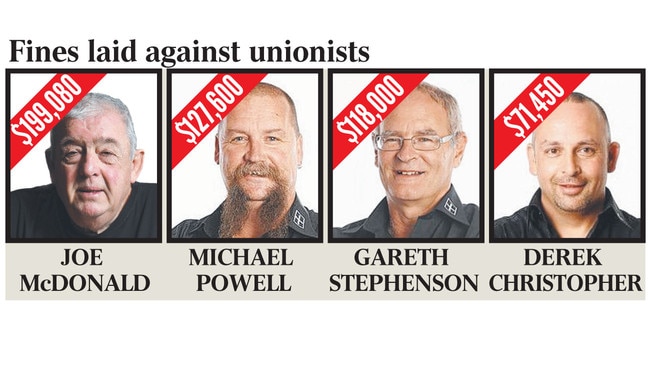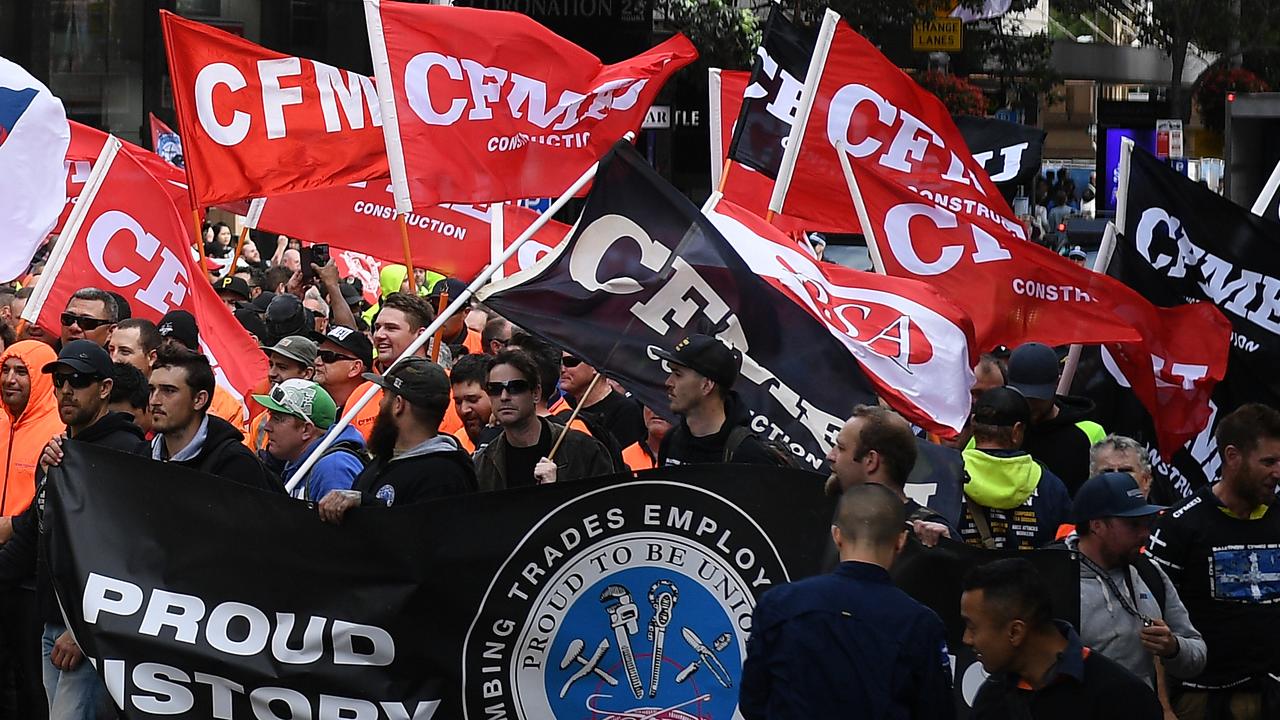CFMEU bailouts for lawbreakers halted
Union officials can be hit with orders stopping unions paying fines on their behalf under a landmark High Court ruling.

Union officials can be hit with orders stopping unions paying fines on their behalf under a landmark High Court ruling that employers predicted would undermine the militant tactics of the CFMEU.
In a second blow to the Construction Forestry Mining and Energy Union, the Federal Court yesterday imposed $1 million in fines for its campaign against concrete supplier Boral, the highest penalty awarded for a breach of the secondary boycott provisions of the nation’s competition laws.
The High Court ruling is a win for the Australian Building and Construction Commission, which wants to curtail the long-running practice of the CFMEU drawing on union funds to pay penalties imposed on officials. ABCC head Stephen McBurney said the decision was important to ensure penalties ordered by courts were not be treated by the CFMEU as “the cost of doing business”.
Master Builders Australia chief executive Denita Wawn said the decision would ensure union officials were held more accountable for their conduct.
“It means unions will not be able to indemnify their officials by paying court fines on their behalf,’’ she said. “Officials will now face the consequences if they break the law, just like everyone else in the community. We can only hope this decision will mean union officials will think twice before breaking the law.”
ACTU secretary Sally McManus said the decision would not stop unions fighting for workers, despite the Turnbull government having “done everything in its power to attack working people’s representatives”. “Unfair fines, unjust laws, politicised police raids, royal commissions and constant character attacks did not stop us fighting for working people,’’ she said.
“Neither will this decision.”

The High Court held the courts do not have the power to order a union not indemnify an official against a penalty, but a majority held a personal payment order that stops an official accepting indemnity or a contribution from their union towards a penalty can be made under the Fair Work Act.
The High Court majority said the principal object of an order that a person pay a pecuniary penalty was deterrence.
The judges said an order that a contravener must not seek or receive indemnity from his or her co-contravener in respect of a pecuniary penalty “assists in accomplishing the calculated level of sting or burden of the pecuniary penalty”.
Mr McBurney said the “important” ruling confirmed that a personal payment order could be made against an individual”.
“Such orders are designed to ensure that the person responsible for unlawful conduct cannot avoid paying the appropriate penalty,’’ he said.
Australian Industry Group chief executive Innes Willox said the decision would be “very important in reinforcing the rule of law in the construction industry … The decision will discourage CFMEU officials from blatantly disregarding industrial laws because, if they do, they can be ordered to personally pay large fines from their own assets.
“Despite numerous fines being imposed on the CFMEU and numerous strong criticisms from judges, the CFMEU has not changed its unlawful behaviour.
“Hopefully, this decision will finally lead to CFMEU officials taking responsibility for their own actions and complying with the law like every citizen in a civilised society is rightly expected to do,” he said.
The ABCC successfully applied to the High Court last year for special leave to appeal against a Federal Court full court decision. The decision set aside an order banning the CFMEU from paying an $18,000 penalty on behalf of one of its officials, Joe Myles.
Mr Myles and 20 people parked vehicles across the entrance to a Regional Rail Project site in Victoria, blocking Boral concrete trucks.
The 24.4 cubic metres of concrete in the trucks and 24.4cu m already poured were wasted.
Mr Myles threatened a superintendent with “war” if his demands to put a CFMEU delegate on site were not met.
In a full court decision, Federal Court Chief Justice James Allsop set aside judge Debra Mortimer’s prohibition on the CFMEU paying the penalty imposed on Mr Myles, finding she did not have power under the Fair Work Act to make the order.
The Australian Competition and Consumer Commission yesterday welcomed the $1m in fines imposed on the CFMEU for secondary boycotts against Boral and its subsidiary Alsafe at Melbourne building sites.
The ACCC launched legal action against the CFMEU in 2014, seeking penalties for the alleged blacklisting of Boral that occurred at the height of the union’s dispute with Grocon. Boral was Grocon’s exclusive concrete supplier.
Federal Court judge John Middleton ruled the CFMEU contravened the Competition and Consumer Act by engaging in conduct in concert with a shop steward that hindered or prevented the acquisition of concrete from Boral and Alsafe.
It ruled the conduct was designed to cause substantial loss or damage to Boral’s business and was likely to have that effect.



